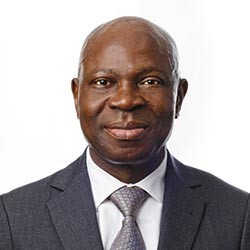Food Security and Diplomacy Dialogue, Remarks by Gilbert Houngbo, President of IFAD
IFAD Asset Request Portlet
ناشر الأصول
Food Security and Diplomacy Dialogue, Remarks by Gilbert Houngbo, President of IFAD
03 فبراير 2022Let me begin by thanking Le Cercle des Ambassadeurs à Paris and the World Diplomatic Academy for hosting this high level panel on food security and diplomacy.
I would also like to thank His Excellency Jean-Paul Carteron for his kind invitation. Although I can’t be with you in person, I do hope my thoughts will add value to the discussion.
Before looking at diplomacy as a solution to food security, let me outline some of the key issues.
Even before the pandemic, hunger was on the rise. In 2020 alone, up to 811 million people went hungry. At the same time, at least 3 billion people did not have enough money to buy nutritious food.
For IFAD, the challenge of food security is two-fold. On the one hand, there are the immediate, short-term concerns. How do humanitarian groups access food stocks and resources to feed those most in need? And how do they deliver them efficiently and safely?
On the other, there are the long-term questions. How do we transform food systems so they become resilient and inclusive? How do we end the scourge of hunger? And how do we ensure that small producers are fairly compensated for their work?
Unsafe or unsustainable food systems are often part of the problem. But the reverse is also true. Sustainable food systems can be part of the solution.
If we can transform food systems, they can help us address food security and poverty.So how do we address the short and the long-term?
Cooperation and unity are key. The challenges we face are too large for any single state to solve on its own. Global challenges require global diplomacy and multilateralism.
The world has not stood idly by. For example, there are already actions emerging from the UN Food Systems Summit.
IFAD is co-leading a coalition to ensure small producers earn decent wages and a living income. We are also co-leading an to mobilize private finance for the benefit of global food systems. And we are co-leading the Coordination Hub as a follow-up to the Summit.
We want the entire UN family working on food systems, whether by supporting national governments or by advancing progress on the SDGs.
But multilateralism in the realm of food security goes far beyond global Summits.For example, IFAD is helping unlock the potential of public development banks across the world. On the one hand, we want these banks to open their doors more readily to rural producers. On the other hand, these banks need to shift investments to support food systems that are more sustainable and more equitable.
We have less than 8 years to achieve the Sustainable Development Goals in 2030.To make progress, we can no longer maintain silos and tackle each challenge on its own. More than ever, we need diplomacy to make the connections between sectors, and between people.
